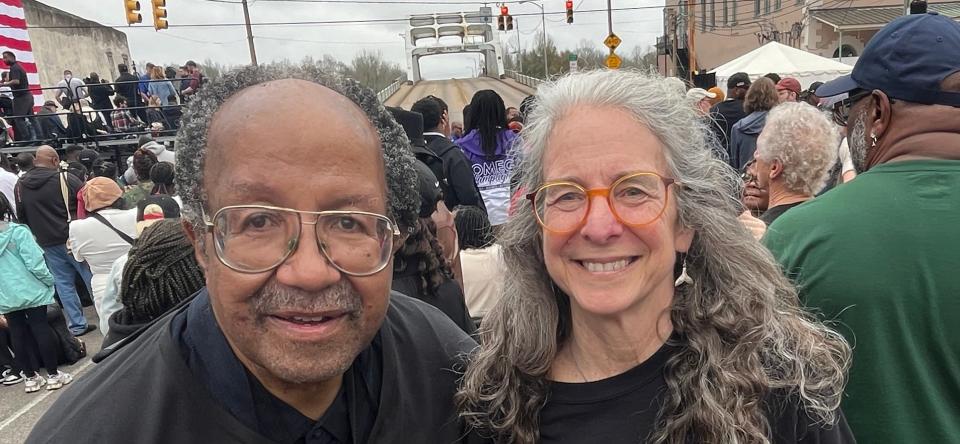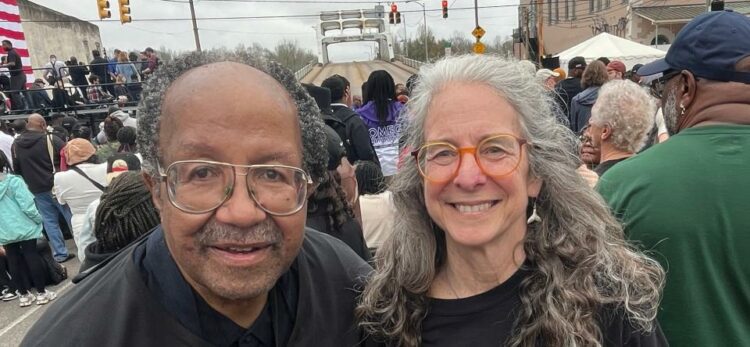This column appears every other week in Foster’s Daily Democrat and the Tuskegee News. This week Guy Trammell, an African American man from Tuskegee, Ala., and Amy Miller, a white woman from South Berwick, Maine, write about education in our communities and beyond.
By Amy Miller
In the 1800s Sir William Curtis introduced the three Rs, calling for Reading, ‘Riting and ‘Rithmetic as basic skills of education. We’ve come a long way from there, with schools embracing everything from music and the arts to computer literacy and physical education.
In South Berwick, an entire 96% of the adult population has at least a high school diploma and more than 35% has a bachelor’s degree or higher. I would never argue against the imperative of a formal education covering the basics.
But I have a suggestion of my own, a fourth R – reporting.


Amy Miller and Guy Trammell Jr.
Why not send every high school kid out to do interviews with politicians and police, bankers and businessmen, and then come back and write what they learn.
In fact, the Marshwood District in South Berwick and Eliot has begun actively sending kids out into the world. The high school’s new Extended Learning program gets students working in real-life jobs, learning about cosmetics, welding, mechanics or computers, for instance, and about how to function in a work environment.
If we had a mandatory year of national service, which a Gallup poll said roughly half of Americans support, I’d suggest we assign youth to a year of covering local government. Since we do not, how about adding a category of service to AmeriCorps?
The federal agency for national service and volunteerism, AmeriCorps sends tens of thousands of Americans, many of them young adults, out into the world with a mission to “improve lives, strengthen communities, and foster civic engagement.” Why not send reporters into the field? At a time when journalism is suffering under the weight of social media and unsustainable economics, this would be a gift to our democracy.
Covering small town meetings, photographing farmers at the county fair, and interviewing everyone from scientists to barbers, auto mechanics to artists, provides an education like no other. Two years at a small daily paper would give young Americans a foundation in everything from inquiry and writing to local politics and cultural awareness.
When I started as a reporter, I didn’t know what a culvert was or what a town councilor did. Sure, Mrs. Shoemaker’s third grade classroom etched in my brain that the sun is 93 million miles from the Earth. And yes, I will always remember the Greek versus the Roman gods from a ninth grade English project.
But nothing compared with the knowledge gained outside a classroom. In newsrooms, I learned not only to write accurately on strict deadlines but to ask questions without fear and to synthesize information into critical elements. I learned to listen carefully and to understand the world from points of view different from my own.
At a time when understanding the perspective of others is in short supply, when each of us has trouble respecting views that are not our own, what better way to educate young people than to have them record the ideas and experiences of others. This is an education that reaches beyond the walls of a classroom. It is an education on how to live better, listen better, and understand better.
Here’s to the four Rs.By Guy Trammell Jr.
In 1900, Tuskegee Institute was Alabama’s largest school. Graduates were required to teach for two years within 20 miles of campus so Booker T. Washington created 52 Macon County communities, each with a church, a business and a school.
He invited Black farmers to relocate here so their children would live close to a school. Unofficially, Washington was our first county superintendent of education.
George W. Carver would drop in at these schools with science projects and teach impromptu classes with the children. He also wrote the curriculum for the 5,000 Rosenwald schools.
My great-uncle was the machinist for Booker T. Washington and Carver. My two great-aunts taught food science and vocal music at the college. My parents, my brother, three other aunts and an uncle also were teachers, so education was a top family priority.
Education was important throughout our African American Village of Greenwood. Nearly every adult asked children how we were doing in school, expecting an answer. Our education was an investment in the future.
From the Russian Symphony’s campus visit, to plays, lectures and science experiments, children were in the audience. We learned about European music composers in third grade, mapping and geography in fourth grade, operated the school snack business by sixth grade, and learned French and judicial systems in seventh grade.
One year, my mother’s summer break from teaching involved traveling the county with another teacher, Mrs. Copridge, recruiting families in the first year of the nation’s Head Start program.
The 1963 desegregation of my high school caused integration of all Alabama schools and a national public school desegregation mandate. It also created publicly funded “white only” schools, beginning with Macon Academy only a block from our school.
In October 1979, President Jimmy Carter created the cabinet level Department of Education. This was important because weakened school systems produce an uneducated public that accepts bad government policies.
The department also ensured equal access to education, disrupting the system of laborers trapped in a social status based on skin color or being a woman, who can never progress to management, administration, board of directors or corporate ownership.
The Department of Education currently serves 49.4 million students in 98,577 public schools. It funds disability assistance, access to education regardless of financial status, free school meals, and Pell grants for college tuition.
In May 2024, Alabama rejected school summer meals programs. It was reversed in June, and this comes next: a) plans to eliminate the Department of Education, b) taxpayer support for private white-only schools, c) public schools training students for military recruitment.
Get informed and act! Our children are under attack!
Guy and Amy can be reached at colorusconnected@gmail.com
This article originally appeared on Portsmouth Herald: Musings on education from Maine and Alabama: Color Us Connected
Source link : http://www.bing.com/news/apiclick.aspx?ref=FexRss&aid=&tid=66b8866139ac4a2a9fbce174e3d9e112&url=https%3A%2F%2Fnews.yahoo.com%2Fnews%2Fmusings-education-maine-alabama-color-090223173.html&c=10172142959366565165&mkt=en-us
Author :
Publish date : 2024-08-10 22:02:00
Copyright for syndicated content belongs to the linked Source.
